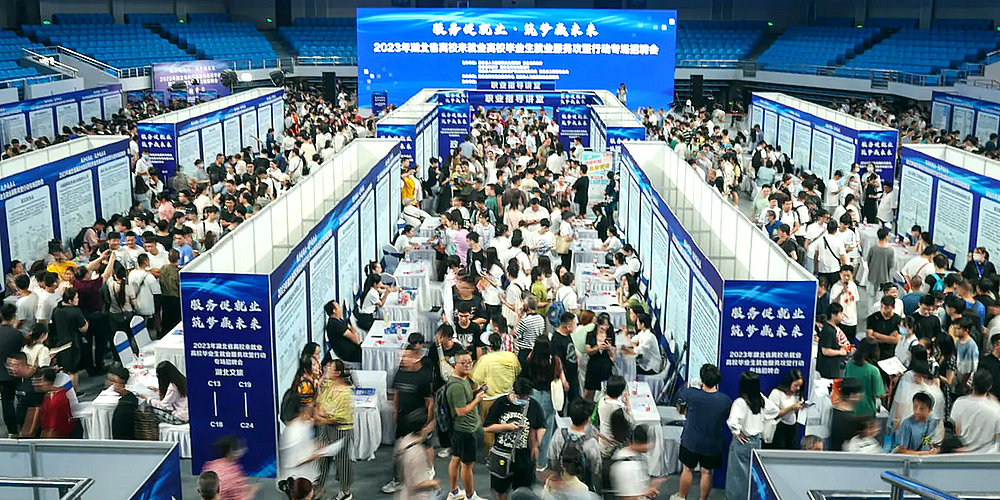BEIJING: China stopped publishing data on its rising youth unemployment rate on Tuesday, as it released a raft of disappointing figures that stoked concerns over the state of the world’s second largest economy.
Shortly before the latest uninspiring indicators were published, the central bank cut a key interest rate in an effort to boost flagging growth.
The new data added to a slew of figures in recent months reflecting a slump in China’s post-Covid rebound, with joblessness among 16- to 24-year-olds hitting a record 21.3 percent in June.
But the National Bureau of Statistics (NBS) said on Tuesday that it would no longer release age-group-specific unemployment data, citing the need to “further improve and optimize labor force survey statistics.”
“Starting from this August, the release of urban unemployment rates for youth and other age groups across the country will be suspended,” bureau spokesman Fu Linghui said at a press conference.
Overall unemployment rose to 5.3 percent in July compared with 5.2 percent in June, the NBS said.
College student Li Nuojun told AFP in Beijing on Tuesday that the rate of joblessness among young people had her “very worried.”
“When thinking about finding a job, I become very anxious,” the 18-year-old added.
Slowing retail sales
As indicators of an economic slowdown have piled up, many experts have called for a large-scale recovery plan to boost activity.
“In order to revive demand quickly, we think that the more effective policy option at this junction would be to embark on a central government-backed consumption stimulus measure,” said Societe Generale analysts Wei Yao and Michelle Lam in a note.
But for the time being, authorities are sticking to targeted measures and declarations of support for the private sector — with little in the way of tangible steps.
Tuesday’s announcement that youth unemployment data would be suspended came as Beijing released a series of weak economic indicators for July.
Retail sales, a key gauge of consumption, grew 2.5 percent year-on-year in July, the NBS said, down from 3.1 percent in June and falling short of analyst expectations. Industrial production grew 3.7 percent in July from a year ago, down from 4.4 percent in June.
The suspension of youth jobs data “may further weaken global investors’ confidence in China,” Ting Lu, China economist at Nomura, said in a note.

‘Gagging and blindfolding’
Chinese social media users were skeptical of officials’ explanation for the move, with the topic receiving over 140 million views and tens of thousands of comments on the Weibo platform.
“Can you solve the problem by gagging and blindfolding yourself?” asked one Beijing-based user in a post liked by more than 3,000 people.
Chinese leaders have sought to boost domestic consumption in recent weeks, with the State Council last month releasing a 20-point plan to encourage citizens to spend more in sectors including vehicles, tourism and home appliances.
The country’s top brass has warned that the economy faces “new difficulties and challenges” as well as “hidden dangers in key areas.”
The recent data suggests China may struggle to achieve a five percent growth target set for the year. The economy grew just 0.8 percent between the first and second quarters of 2023, according to official figures.
Rate cut
In a surprise move, the central bank on Tuesday cut the medium-term lending facility (MLF) rate — the interest for one-year loans to financial institutions — from 2.65 percent to 2.5 percent.
A lower MLF rate reduces commercial banks’ financing costs, in turn encouraging them to lend more and potentially boosting domestic consumption.
“We believe the Chinese economy is faced with an imminent downward spiral with the worst yet to come, and the rate cut this morning will be of limited help,” Lu of Nomura said.
The country slipped into deflation for the first time in more than two years in July, due to waning consumption and flagging exports.
While cheaper goods may appear beneficial for purchasing power, falling prices can actually lead to decreased demand, fueling a vicious circle that actually drags down the wider economy.
ADVERTISEMENT
ADVERTISEMENT








































